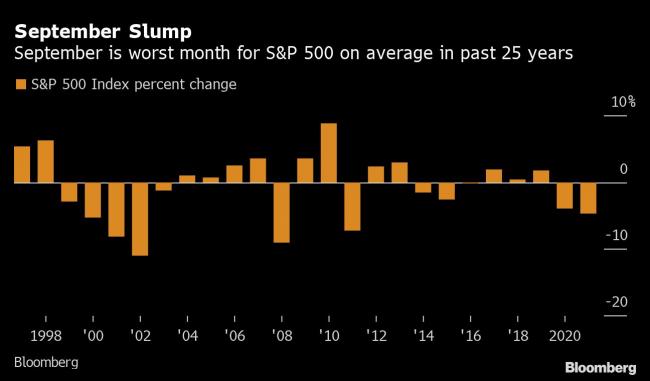(Bloomberg) -- Wall Street is on edge as it heads into a dangerous final few months of 2022 with the Federal Reserve set to keep raising interest rates and the calendar flipping to September, historically the weakest month of the year for stocks.
Investors who were thinking this year’s rise in inflation would be short-lived are growing worried about how long the pressures will persist. That spurred a fast rise in the 10-year note yield in August, which rattled growth shares, upending the stock market’s $7 trillion early summer rebound.
Wall Street will be paying close attention to Friday’s jobs report for any signs that the labor market is faltering. The economy remains strong with the unemployment rate now sitting at a 50-year low of 3.5%, which in theory should be good news for markets. But robust jobs growth means the rate increases that have sent stock and bond prices lower this year aren’t likely to go away anytime soon.
“It’s all about the employment data,” said Tony Dwyer, chief market strategist at Canaccord Genuity. “We have to get into a position where bad news will become bad news,” that will push S&P 500 consensus earnings estimates lower, he explained. “That’s where the market becomes more attractive to us because that generates a real Fed pivot.”
Earnings-estimate revisions for the S&P 500 have continued to fall in recent weeks and well into 2023, pulling the index’s third-quarter growth forecast down to 3.9% from preseason expectations of 9.7%, according to Bloomberg Intelligence.
Seasonal Disorder
The S&P 500 surged 17% from it’s mid-June low through mid-August, giving traders hope that the bottom was in. Now that looks less likely after the broad equities benchmark sank in the final weeks of last month and finished August down 4.2%. Now it heads into September, traditionally rockiest time for the stock market.
“There are more reasons this time around for investors to be worried in September,” said Sam Stovall, chief investment strategist at CFRA. “The big fear is that the Fed will overdo it with rate hikes and force the US economy into a recession. Adding to those concerns is Russia. Will we find out they’re curtailing energy deliveries to Europe? Will Europe go into a recession? If so, how deeply? What about rate hikes from other central banks around the world?”
Dwyer expects US stocks to retest their June lows. He also worries that equity gains could be limited this fall since elevated inflation will likely keep the Fed continuing with the most aggressive rate hikes in decades to curb high prices. And while corporate earnings have been better than feared this season, strategists at Morgan Stanley (NYSE:MS) and Bank of America Corp (NYSE:BAC). warn that profit estimates need to be cut much further before stocks can find a true low.
Spooky September
While October is the stock market’s most volatile month with crashes in 1929, 1987 and 2008, September has been worse for returns. Over the past 25 year, the S&P 500 has averaged a loss of 0.7% in September, according to data compiled by Bloomberg. And going back to World War II, the broad equities benchmark has averaged a decline of 0.6% this month, data from investment research firm CFRA show.
There are a few theories as to why September is traditionally so weak. For starters, many investors return from their summer vacations and have to reassess their portfolio positioning. Corporate budgets are also prepared for the coming year, with companies debating whether to tighten their belts. And near the end of their fiscal year, mutual funds often will engage in window dressing by selling positions they hold at a loss to reduce the size of their capital-gains distributions.
Of course, September is just one of many seasonal patterns that investors are watching heading into the fall. Another issue plaguing stocks is US midterm elections. The stock market tends to struggle early in midterm years due to the potential for policy changes in Washington, but it then rallies at year-end once the results are in.
Although Louise Goudy Willmering, a partner at wealth-management firm Crewe Advisors, is still betting on stocks rising over the long term, her firm is urging clients to stay diversified.
“Investors should mentally prepare for more turbulence,” Willmering said. “Although a lot of the pain has been already been priced into stocks, don’t get too excited about the pull back in growth sectors. With interest rates rising, it’ll take longer for those shares to gain traction again.”
©2022 Bloomberg L.P.
